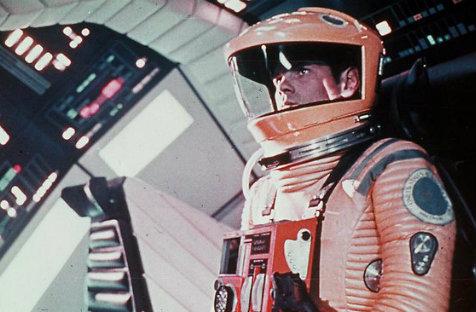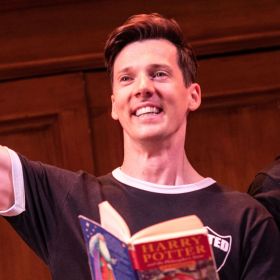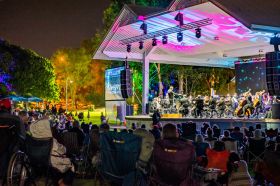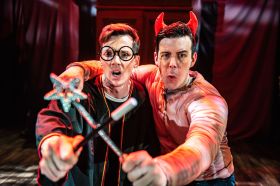You don’t see many conductors who get time to twiddle their thumbs and twirl their batons, but this is precisely what happened (sans baton-twirling) at the Sydney Symphony’s latest concert, 2001: A Space Odyssey – presented as part of the Sydney Festival, that summer fixture which this year has manifested itself most notably as a giant rubber duck floating in Darling Harbour. (I’ve seen the duck, though I’ve yet to see a bathtub that’d be big enough to fit it.)
Patrons who have seen the Sydney Symphony’s recent cinematic concerts, with the grand orchestra playing grand soundtracks to grand movies, would have had some idea of what to expect from the latest incarnation of these filmic forays. The first two Lord of the Rings films (the third being played this year) were huge affairs, featuring the Sydney Philharmonia Choirs and Sydney Children’s Choir, along with guest vocalists and a large orchestra. Speakers, hanging from the top of the Sydney Opera House Concert Hall cavern, pumped out the diegetic sound (that is, the sound happening within the world of the movie, such as characters talking and swords clashing), assisted by on-screen subtitles for when the near-constant stream of music was too much. Yet things were slightly different this time around. There were speakers, yes. And there was an orchestra and the Sydney Philharmonia Choir too. But there were no subtitles. And why were there no subtitles? Because there wasn’t all that much music.
For a film that’s so famous for its music – think of ye olde Strauss’ Blue Danube waltz as the Pan-Am space-liner slowly and steadily docks with the revolving space station, or the more modern Strauss’ sunrise from Also sprach Zarathustra as the sun moves out from behind the Earth – when one actually sits down to watch the movie, one finds a surprisingly large amount of time where nary an instrument can be heard. Which equates to many a section where the conductor for the evening, Andre de Ridder, was able to have a nice little sit-down. One can’t be exactly scientific about it, but for a film that goes two hours and twenty minutes, there wouldn’t be any more than an hour’s worth of music in it, and much of the music is repeated.
This isn’t a problem with the film, nor is it a fault of the orchestra’s, but one can’t help wondering if the person who paid much the same price for a ticket to The Lord of the Rings would feel slightly let down by the rather large drop in musical quantity. One also feels sorry for those sat in the back of the orchestra who couldn’t turn their heads to watch the screen when their services weren’t needed.
That being said, this was still a worthwhile experience, although it was perhaps somewhat harder to relax into the soundtrack. In a film where the music is constant, you lose the conscious sense than an orchestra is playing, whereas the stop-start nature of this was slightly jarring throughout, and so the immersion wasn’t as complete. The performance itself was excellent, with the brass handling all the important sections with ease, and the Sydney Philharmonia Choir proving themselves very adept at eeriness during Ligeti’s unsettling compositions, where moans piled on cries like a hellish mound of bodies climbing on each other towards a dying sun.
The end of the film, just like the start (where the audience clapped the first sunrise), was met with great applause, even as the orchestra played on through the credits, running through most of the Blue Danube scored to accompany those scrolling names in white. Strangely there was quite a bit of chatter, as everyone gave everyone else their opinion, presumably, of what they’d just experienced, and it wasn’t until a few minutes into the credits that the conversation died down once more – a most curious happening, indeed.
But what else is there to say? If you like Kubrick’s film, you like it, and if you don’t, you don’t. I, personally, do, and thought this a great way to experience it. One looks forward to the finale of The Lord of the Rings trilogy, as well as the beginnings, perhaps, of a new one, with the first Pirates of the Caribbean film to make an appearance later this year.
Rating: 4 stars out of 5
2001: A Space Odyssey
Sydney Symphony
Sydney Philharmonia Choirs
Andre de Ridder (conductor)
Concert Hall, Sydney Opera House
24 – 25 January
Sydney Festival 2013
www.sydneyfestival.com.au
5 – 27 February
2001: A Space Odyssey will also be presented as part of the Adelaide Festival, with conductor Robert Ziegler leading the Adelaide Symphony Orchestra and Adelaide Chamber Singers.
Festival Theatre, Adelaide Festival Centre
www.adelaidefestival.com.au
8 – 9 March





